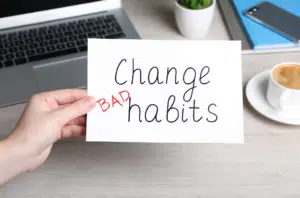How you can promote success through practicing self-care.
Anyone who has flown in an airplane has heard the safety lecture where we are told that we must place our face mask on before assisting others. We often use this as a metaphor to take care of ourselves before taking care of others. I too use this comparison with my clients regularly.
But, there is a more important and vital message in the safety lecture – putting on the mask. We must ensure our bodies have what they need. This is a requirement whether you intend to help someone else or just need to save your own life.
Our everyday lives aren’t much different from the airplane example. Life can be a bumpy ride, and whenever the warning light comes on – if we even stop to acknowledge it – we tend to ignore it by focusing on something or someone else.
The damage of the neglect is not always immediately evident.
Many of the unhealthy habits we engage in are done automatically without us even noticing we are doing it (on auto-pilot). These “bad” habits may feel familiar, good, or are simply easier than the better alternatives.
What are some reasons you give to justify neglecting your self-care?
Whatever the reason(s) you neglect your self-care, one thing is certain: The damage accumulates over time and impacts your wellbeing. And, the longer you neglect your self-care, the more effort you need to dedicate later to reverse the damage.
Sadly, we live in a society that has historically celebrated the struggle of success. Personally, I sat through far too many dinners where people raved about how little sleep they were getting or the long hours they were putting in. I used to be those people. I was convinced I had to work just a little longer; a little harder… The cycle never ended. I would reach a milestone and immediately start working toward the next one. The goal just kept moving and I kept chasing.
After years of operating this way, I had an awakening moment that I needed to start to prioritize myself and the life I had neglected for far too long. Making small changes – dedicating time to lunch, walking regularly, leaving the office earlier – led to more significant changes – restructuring my business, taking my first vacation in FIVE years, etc. I was able to spend more time with my mother before she passed away, reconnect with friends I had neglected, and pursue hobbies.
The concept of self-care may seem simple, but application can be difficult.
I spent endless hours telling my clients all about the importance of this while not fully embracing it myself. After my mother passed away, I went on my first hiking trip. I had never hiked before but the idea of doing something new was really appealing. I never could have anticipated how transformative this experience would be for me.
It led me to make changes in the counseling business I owned and led to the creation of Ancorio where I run retreats to help others experience the benefits of taking time away from the stress of daily life to focus on themselves.
I felt like I was living an entirely different life! Not only was I happier, but I was also more productive than ever.
While I believe everyone can benefit from taking time away from the hustle-and-grind of everyday life, investing a short amount of time each day to your self-care can benefit you for years to come. Practicing self-care contributes to your general wellbeing, which, in turn, increases your chances of success.
Self-care does not take away productivity time, it increases it!
Mental breaks allow your brain to properly recharge so you can accomplish more in less time.
Read that again.
Mental breaks allow your brain to properly recharge so you can accomplish more in less time.
No more “I don’t have time”. Investing short amounts of time in self-care will help increase the time you feel you have each day because you will experience increased concentration, energy, and focus.
We all have different needs. As such, self-care looks different for everyone. When I polled my followers, some of their favorite self-care strategies were:
- Long, hot shower
- Listening to music
- Working out
- Lighting a candle
- Taking a walk
- Reading a book
- Drinking tea
- Making a puzzle
- Meditating
- Looking at photos
- Wearing comfy clothes/PJs
- Snuggling pets
- Hiking
- Biking
- Traveling
While some self-care activities involve decluttering your mind, others focus on reducing stress. Other activities are designed to keep your mind sharp. In addition to the wonderful list above, here are three self-care practices to help you feel at ease and set you up for success:
-
Mindfulness.
Mindfulness is a mental state where you focus your awareness on the present moment, while acknowledging and accepting your feelings, thoughts, and bodily sensations without judgment. When you are mindful, you pay attention to your experiences, emotions, thoughts, and all that is in your surroundings. Increasing attention to yourself in the present moment is an important practice.
-
Take time off from electronics.
Many of us rely on our smartphones to soothe boredom and lack of interest. Binge-watch TV shows, watching hours of videos on YouTube or TikTok, and mindlessly scrolling through social media are all forms of electronic distractions. Sadly, I know I am guilty of using my phone as a go-to distraction.
It is important that you take regular breaks from electronics. There are numerous benefits of these breaks. One example that highlights the ripple effect of taking a break from electronics: You can pay more attention to the task you’re working on. Your increased focus increases your task performance, which leads to completing the task more quickly and decreases the likelihood of making careless mistakes.
Another benefit from breaks with electronics are all the things you can complete with that time instead. Maybe you can complete a simple chore, do a brief meditation, or your favorite relaxing activity.
-
Positive self-talk.
Positive self-talk leads to feeling empowered, encouraged, valued, and supported rather than mercilessly criticized. It is not lying to yourself to feel better, but positive self-talk is a way of neutralizing our natural tendency to focus on perceived flaws and increase our attention to also notice positive traits we possess. For example, after I have made a mistake, I might say to myself “I am capable of learning from my mistakes”. I am not pretending to be happy about the mistake but, instead of belittling myself, I look at the possible outcome.
Utilizing positive self-talk leads to feeling more capable of dealing with stressful events in constructive ways. You don’t have to take my word on this! Research shows that supportive self-talk can promote success! A study conducted with adult athletes has found that positive self-talk increased performance, reduced anxiety, and enhanced the subjects’ self-confidence.
Self-care is a requirement for success, not a reward for it.
No matter how busy you are, taking care of your mental needs is vital for your wellbeing. Bottom line: Maintaining your mental wellness is essential to our quality of life.








